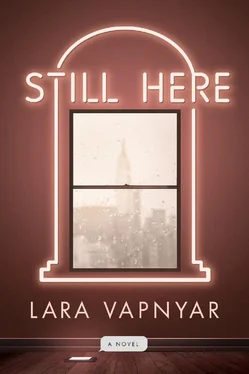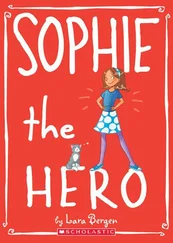She proceeded to examine several mummies. It was hard to believe that all of them used to be real people. Thousands of years ago, but still. They ate, they slept, they peed. She tried to imagine herself as an Egyptian woman, caring for her child, pining for her husband, all the while wearing that interesting headdress and jewelry. That jade snake must have felt deliciously cold against the skin. Vica moved to look at a photo essay documenting the embalming process.
She read the caption. “Then the embalmers would turn the body facedown to allow the brain to ooze out through the nostrils.”
The image of her own brain oozing through her nostrils made her feel suddenly sick. She rushed through all the rooms toward the exit, then ran down the steps and stopped to take a deep breath. Vica didn’t know where to go; she just wanted to get away, away from the mass grave of the Egyptian wing, away from the museum.
She started to walk down the park’s East Drive. Usually crowded, in this weather the drive was practically deserted. There were no bikers and just a couple of joggers. A thin man in a blue jogging suit and a white knitted hat passed Vica. Sergey! was Vica’s ridiculous first thought. What is this white hat — I’ve never seen it before.
Then she took another look and saw that the man didn’t resemble Sergey at all. This was the second time today she’d made that mistake. Vica wondered how much longer it would take to free her mind from Sergey.
She swerved in the direction of the boathouse and started to walk along the lake toward the Bethesda Fountain. The cold now flapped around her in waves, hitting her on the legs and the shoulders.
The clearing by the fountain was mostly deserted as well. Vica walked right up to the statue and peered into the angel’s face. The expression was cold and strict rather than ethereal.
The last time they were here Sergey told Eric the story of the Angel of the Waters. How there was a fountain like this in Jerusalem and all the sick, blind, and crippled people were lying by the edge waiting for the angel. Every once in a while the angel would come and disturb the waters, and then the first person who got in would be cured.
“What do you mean ‘the first one’?” Eric asked. “Only the first one?”
“That’s how it worked. The person who got into the disturbed water first was cured.”
“But that’s so unfair! That means only the fastest and strongest could be cured.”
“That’s the whole point,” Sergey said. He tried to tell Eric about this one paralyzed man who could never get to the water in time, so Jesus performed a miracle and cured him himself, but Eric wouldn’t listen.
“Still unfair! The whole thing with the angel is a miracle, right? I don’t get what’s the point of a miracle if it’s so unfair!”
Sergey tried to explain that the term miracle used to have a completely different meaning, then he got really annoyed and gave up.
Eric was a strange boy. The girls thought he was ugly and the boys thought he was a geek. Vica wouldn’t have minded his being a geek, if he was a determined one, if he was reading a lot. He wasn’t. He hardly read at all. But he was smart. He was! He liked to think things through. “I want to know exactly what I will feel when I die, that way I won’t be that scared,” he’d said to her once. And he was kind. He was. He was capable of empathy in a way few people were.
Getting into that school would put him among other children like him, smart and weird and sensitive, and he would finally fit in. Being in that school would show him the point of learning. He’d learn how to read analytically, he’d learn how to look at art, he’d learn why people read, he’d learn why people looked at art. He’d learn how you could find something true, intimate, and personal, in the most unimaginable of places, in Egyptian art made a thousand years ago. No, Vica didn’t hope that this school would make him feel privileged and self-assured like Eden, like Eden’s husband, like Eden’s sons — nothing would. And she didn’t hope that this school would make him happy. She knew that people who went to good schools had their insecurities and their little miseries and their own ugliness, but still, she believed that even their unhappiness was far more interesting. A school like that opened the whole world for you. If you were bound to be miserable, you could have a whole variety of options, you could choose your own misery, not have one forced on you.
Just last week, when they were walking along the beach on Staten Island, Vica thought she would try to explain all this to Eric. But how do you talk about these things with a child? The day was surprisingly mild, and the wind was strong but not cold. They were heading toward their favorite picnic spot by the salt marsh, but it happened to be high tide, so there wasn’t as much dry land as usual. Vica started to walk down the mossy, crunchy path built by colonies of mussels. “Mom, you’re hurting the mussels, can’t you hear it?” Erik said. She stepped away, but then her feet started to get wet. Erik ran to the beach and hauled back a large log stuck in the bushes. He put it over the wet area so that Vica could use it as a little bridge. She smiled and bumped Erik on the shoulder. He bumped her back. She felt good, and she thought that she didn’t have to explain anything to Eric, that he understood. In his own way, he understood her better than anybody else.
—
Vica hit Eric for the second time just outside the Castle school.
The other parents were crowded by the entrance, looking anxiously at the door, Susan Sontags and Outer Boroughs alike. They started to let the children out around twelve forty. The children were walking out in trickles of ten or twelve. Eric walked out alone. He didn’t see her at first; he stood there turning his head to the right and to the left, scanning the faces of parents. She yelled out his name and waved. He waved back.
“I’m hot,” he said. She touched the top of his head. His hair was a little damp.
“How was it?” Vica asked. “Tough questions?”
He nodded. He looked a little shell-shocked, but not upset. She would even say that he looked relieved. Vica took that as a good sign.
“Did you answer them all?”
He said, “Yeah.”
“And what about the essay? What was the topic?”
He said, “It was okay, not too hard.”
“But what was the topic?”
He sighed.
She said, “Okay, fine, I won’t ask. Better not to ask, not to jinx it, right?”
He nodded. She smiled and kissed him on the top of his head. He thought that public kisses were embarrassing, but he made an exception for the ones on the top of his head.
“Okay, let’s get out of here,” she said.
They passed a hot dog cart. Eric looked at her. Normally, she wouldn’t have allowed hot dogs from a street cart, but these smelled so good and she was so hungry, and she knew that Eric must be hungry as hell.
She bought two. Both with mustard and ketchup.
Eric was about to bite into his when she noticed that he wasn’t wearing his hat.
“Where is your hat?”
He wrinkled his nose. “Oh, right!” he said. “I put it in my pocket.”
He reached into his pocket and yanked the hat out, and a pink square fell and landed on the pavement. She bent to pick it up.
“Admission slip? What’s it doing in your pocket? Admission slip? Didn’t you have to give it to the people in there? Admission slip? Why do you still have it?”
She would have preferred to keep asking these questions to delay the answer, which she knew, which she had guessed right away.
“You didn’t take the test, did you.”
He hunched his shoulders and started to cry, the hot dog still in his hand. He was saying something to her, quickly, quietly. How he had spent the entire time hiding in the bathroom. How he didn’t want to go to that school. How the Castle was creepy. How it had no windows. How these kids were weird. How they were geeks. How they had weird ears. How he didn’t want to go to school with weird geeks with weird ears.
Читать дальше












